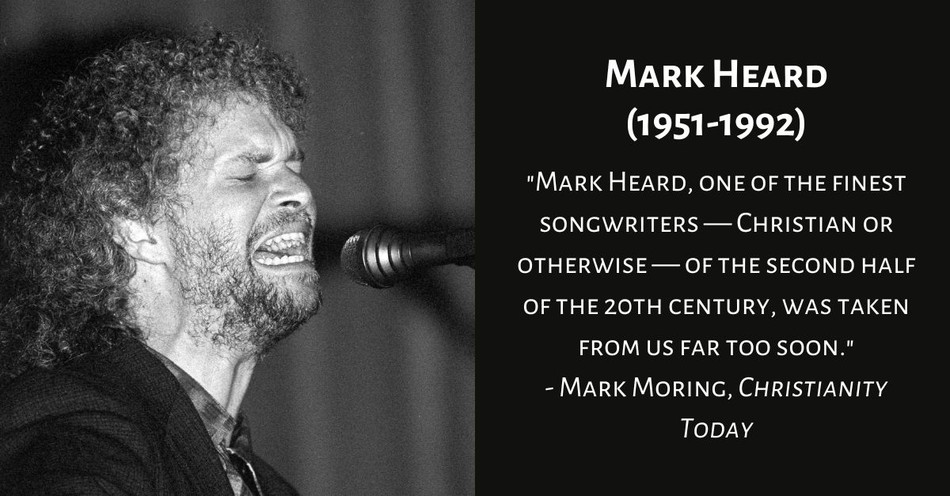Last month marked the 30th anniversary of Mark Heard’s death. In his all-too-short career, fans praised Heard's willingness to write nuanced songs about the good, the bad, and the searching in the Christian life. Variety’s Chris Willman described him as “probably the greatest songwriter the genre produced.”
Despite his craft, Heard never reached the big successes of contemporaries like Rich Mullins or Keith Green. Instead, Heard ended up in the same category as Bruce Cockburn, T-Bone Burnett, Michael Been, and Sam Phillips: musicians who didn’t easily fit the Contemporary Christian Music label. Heard resorted to producing his own music and seemed at the cusp of finally making it big when he died from two heart attacks (one while performing at a Christian music festival).
Here's a look at Heard's life, and why 30 years after his death, he's still worth listening to.
Top 10 Events in the Life of Mark Heard
1. On December 16, 1951, John Mark Heard III was born in Macon, Georgia.
2. In 1970, Heard began studies at the University of Georgia and formed the band Infinity Plus Three. The band would release one album, Setting Yesterday Free, before Heard started his solo career in 1972.
3. In 1973, Heard met his future wife, Janet, at a Campus Crusade for Christ event in Ithaca, New York. They went on to have one daughter, Rebecca.
4. In 1975, Heard’s first solo album, Mark Heard, was released. The same year, Heard traveled with his friend Chuck Long to Switzerland and studied at Francis Schaeffer’s L’Abri center. Schaeffer’s teachings, especially his teachings about art having intrinsic value, continued to influence Heard’s thinking throughout his life.
5. In 1976, Heard met Randy Stonehill and Larry Norman at a Christian music conference and got a recording contract with Solid Rock Records. Heard would later produce many of Stonehill’s songs, including the albums Return to Paradise and Until We Have Wings.
6. Around 1984, after dissatisfaction with his record company at the time, Heard began talking with T-Bone Burnett and various other artists about creating their own label. WHAT? Records was founded in 1986 but only lasted long enough to release five albums (including Heard’s album Tribal Opera).
7. In 1990, Mark Heard founded Fingerprint Records with Dan Russell and Chuck Long. One of the company’s first releases (issued the same year) is Heard’s album Dry Bones Dance, which critics view as the first in a trilogy of Heard’s best work.
8. In 1991, Fingerprint Records released Heard’s album, Second Hand. The same year, his father passed away.
9. In 1992, Fingerprint Records released Heard’s album Satellite Sky. The same year, Heard had a minor heart attack while performing at Cornerstone Festival. A second heart attack seven days later put Heard into a coma, and he died on August 16.
10. In 1994, Heard’s collaborators and colleagues released Strong Hand of Love, a tribute album with an accompanying documentary.

10 Quotes by Mark Heard
One of Heard’s distinct traits is he seemed incapable of giving an insincere answer. His responses to interview questions were always packed with thought-provoking ideas, refusing to settle for cute responses. Here are some of his many thought-provoking quotes about life, faith, and music.
1. “… I realized that Christianity either was the truth or it wasn’t. It wasn’t just something that one might choose to believe, and so that would make it true. If it’s the truth, it must stand up to any type of questions. I believe that questions can help us to root our faith firmly if they’re pursued in the proper perspective. And over a period of time, I became convinced that Christianity was the truth.” — interview with Gerry Howser
2. “I like to write songs about things which cause me to glimpse the worth of God. Sometimes that might be the ocean, sometimes it is love for my wife, sometimes it can be absurdly simple things. After all, we shouldn’t search for a spiritually symbolic rationalization for every activity we enter into. It is not evil to enjoy a good laugh or a hike in the Sierras for what they are. The more we understand these “ordinary” things, the more we see that they are not ordinary at all, but great things, created as such and simply taken for granted by us to the point that we call them ordinary.” — “A Conversation with Mark Heard,” CCM Magazine
3. “You can’t supplant art by talking about it, because that defeats the purpose of it. It’s like the old Louis Armstrong story, when somebody asked him about jazz, and he said, ‘if you have to ask, you don’t know.’” — interview with Roberta Croteau, Release
4. “Someone might classify the songs, as they are apt to do, and say that this one is a theological song or this one is a song about human needs or a love song, but I see it differently. The Christian music industry seems to generally encourage artists to be a bucket with a hole poked in the bottom, so that the water runs right straight through. My approach has been to not poke a hole in it and just let the water fill up and spill over as it might. A lot of those things (ideas theological and human) are inseparable, it’s not like it’s ever just a love song.” — interview with Brian Q. Newcomb, CCM Magazine
5. “… And I think it’s something that we should never forget and lose sight of—that the world is not right, it’s not the way God intended it, and that’s something we should learn to understand. And we should learn to understand the implications of a world gone wrong, and our own experience within that same world, so that we can truly communicate with people outside the church and so that we can truly love them.” — Heard describing his song “Broken Wings,” interview with Gerry Howser
6. “We must learn to understand the worldviews of those around us and not be so smug in our separatism, especially in education. We must understand why the world believes the things it believes. We must go beyond the point of simply confirming the sin of every man—we must get specific, and use our minds like never before. We must care for people. If we don’t do these things, we can’t really offer any good criticism in their eyes—we will only continue to condescend.” — “A Conversation with Mark Heard,” CCM Magazine
7. “Just because Christian culture contains certain trends, I don’t think that the trends are necessarily Christian. The Christians are, but the trends maybe aren’t. Where everybody else usually is, is the large area of commerciality, of things that are known to be saleable. It’s safer if you’re an artist to put your stakes there; if you’re a record company, to hire artists that are like that - who write whatever the most people are buying.” — interview with Karen Marie Platt, CCM Magazine
8. “I hate to see music as only a podium from which one voices one’s convictions. To Christians especially, there is a broad spectrum of human and artistically valuable purposes for making music other than to make background music for a revival meeting.” — “Mark Heard in Conversation: Part One,” New Christian Music
9. “We need to move on from where we are and make our faith real in the eyes of the people around us, taking off our masks and letting them see that ours are human faces as well. Otherwise we are slighting those people and fooling ourselves, and not living up to the expectations that God has of us to present the Truth as the TRUTH, and reality as it actually is—including all its real joy, all its real pain, all its complexity and ambiguities, all its wonder.” — “Mark Heard in Conversation: Part One,” New Christian Music
10. “We have the responsibility to widen the perimeters put on art by Christian culture, to encourage Christian artists to use their minds like never before, to allow their creativity to run FREE and explore EVERY new possibility in art and in communication as real and sincere human beings and as conscientious workers desiring to be true artisans, carefully and honestly exploring the reality of the existence of a loving God in a fallen world.” — “Artist’s Corner: D-Day Again?” by Mark Heard, CCM Magazine
Inspiring Quotes about Mark Heard
1 “Mark Heard, one of the finest songwriters—Christian or otherwise—of the second half of the 20th century, was taken from us far too soon.” — Mark Moring, Christianity Today
2 “There aren’t many records that, from start to finish, offer you a lot of substance. Mark’s music does.” — Dan Russell, interview with Arsenic Ortega, Syndicate
3 “He was perhaps the gentlest and kindest of any musician I have ever known.” — Larry Norman, Why Should The Devil Have All the Good Music?
4 “To me, Mark Heard will always be near the top of that list. He was too good, too smart, and too honest for much of the Christian music industry.” — Chris Hauser
5 “He had an amazing ability to be spontaneous no matter how tired he was. He had great ideas all the time, all the time. He could not stand phoniness, he wouldn’t tolerate it. Anything pretentious was fair game as far as he was concerned. I always liked that about him.” — Piece Pettis, The Phantom Tollbooth

Photo Credit: Getty Images/puhimec
Best Mark Heard Albums
Here is a look at some of Heard’s best work, from his classic folk rock sound to more experimental electronic fare, and including some recent tribute albums.
1. Tribal Opera
3. Second Hand
5. Strong Hand of Love: A Tribute to Mark Heard
6. Treasure of the Broken Land: The Songs of Mark Heard
Where to Learn More about Mark Heard
2. Hammers & Nails: The Life and Music of Mark Heard by Matthew Dickerson
3. The Mark Heard Tribute Project
4. Mark Heard Fans Facebook Group
Cover Photo Credit: Graphic by G. Connor Salter. Photo from Wikimedia Commons/Kenneth C. Zirkel

This article is part of our People of Christianity catalog that features the stories, meaning, and significance of well-known people from the Bible and history. Here are some of the most popular articles for knowing important figures in Christianity:
How Did the Apostle Paul Die?
Who are the Nicolaitans in Revelation?
Who Was Deborah in the Bible?
Who Was Moses in the Bible?
King Solomon's Story in the Bible
Who Was Lot's Wife in the Bible?
Who Was Jezebel in the Bible?
Who Was the Prodigal Son?



